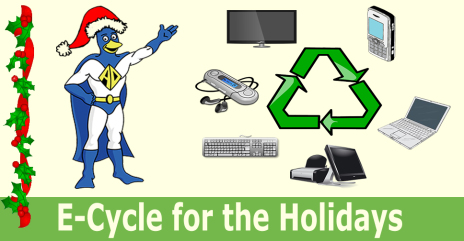E-Cycle for the Holidays
Find vendors who recycle electronics at www.spokanewastedirectory.org
Today’s iPhone has more computer power than NASA used to send man to the moon. Point being, it doesn’t take long for yesterday’s technological breakthrough to become a relic ready to be tossed. In 2009, 2.7 million tons of electronics entered the waste stream in the United States. The shame is electronics don’t have to be a waste at all. Rather, they can be recycled and reused.
What options are there?
Many people don’t realize how easy it is to recycle electronics. You can e-cycle for free within minutes of your home or business. In 2009, the Department of Ecology created E-Cycle Washington, a program allowing households, small businesses, schools, small governments, special purpose districts, and charities to recycle electronics for free at registered collection sites.
Televisions, computers, computer monitors, portable or laptop computers, e-readers and portable DVD players can all be recycled for free through this program. Although electronics peripherals aren’t included as part of Washington E-Cycle, there are recycling vendors near you who accept mP3 players, toner cartridges, cell phones and more.
Well-known e-cycle vendors include Best Buy, Value Village and Goodwill. To see a full list of e-cycle vendors and all the wastes they accept visit www.spokanewastedirectory.org.
What about donation and reuse?
If your electronics still work, donating them for reuse is a great option. Giving your used electronics a new home provides a valuable community service. There are a number of great causes you can support including cell phone donation for domestic violence victims. To find donation/reuse options, visit SpokaneWasteDirectory.org and filter your results by “Reuse.”
Why is it important to recycle electronics?
Recycling electronics allows heavy metals like lead, nickel, cadmium and mercury to be reused rather than mined. Recovering these materials, cuts down on greenhouse emissions, decreases pollution, saves energy and reduces the amount of resources extracted from the earth. Recycling one million laptops can save the same amount of electricity as 3,657 U.S. homes use in a year.
Where does e-cycle waste go?
The Department of Ecology works hard to ensure E-Cycle Washington vendors operate in good faith. As they explain on their website, “The majority of the electronics are disassembled for recycling here in Washington. Some electronics go out-of-state for processing and some materials are exported for recycling at approved facilities. However, obsolete electronics are not exported to third-world countries. Metals, plastics and glass are separated and sold as commodities to be reused as raw materials in the manufacturing of new products. On average only 2% of the total volume goes to a landfill – mostly particle board from cabinet TVs. Toxic materials such as batteries, leaded glass, circuit boards and fluorescent tubes must be managed properly by approved recyclers. Ecology also requires recyclers to meet standards designed to protect worker safety and health as well as the environment. “

